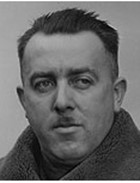Rationale for Inclusion
- Founding the Air Line Pilots Association (ALPA): Behncke established ALPA in 1931, creating the first labor union specifically for airline pilots in the United States. This organization gave pilots a collective voice to advocate for their rights, safety, and working conditions. He led the union for 20 years as its President, retiring in 1951.
- Advocacy for Pilot and Passenger Safety: Behncke was a staunch advocate for improving safety standards in the aviation industry. His efforts led to the implementation of mandatory rest periods, better working conditions, and standardized safety protocols that have significantly enhanced flight safety. Behncke wanted an independent federal agency to investigate accidents as early as 1937. He was the first to advocate the concept that would ultimately become, in 1966, the National Transportation Safety Board.
- Professionalizing the Pilot Career: Through ALPA, Behncke helped to professionalize the role of airline pilots. He fought for standardized pay rates and benefits, which elevated the status of pilots from simply being employees of airlines to being recognized as skilled professionals deserving of respect and fair compensation.
- Legislative Influence: Behncke played a key role in influencing aviation-related legislation. His lobbying efforts contributed to the establishment of the Civil Aeronautics Board (CAB), which was responsible for regulating airlines and ensuring safety and fairness in the industry.
- Labor Rights Advocacy: Behncke’s work with ALPA laid the foundation for labor rights within the aviation industry. His leadership ensured that pilots had the right to unionize and collectively bargain, which has led to improved labor conditions and job security for pilots over the decades.
- Legacy of ALPA: Under Behncke’s leadership, ALPA became a powerful and influential organization that continues to represent and advocate for airline pilots today. The enduring success and relevance of ALPA are testaments to Behncke’s vision and dedication.
- Legacy and Impact: David Behncke’s contributions to the aviation industry are profound. As the founder of ALPA, he laid the groundwork for the modern airline pilot profession and ensured that pilots had a strong voice in advocating for their rights and safety. His legacy lives on through ALPA’s continued efforts to support and protect airline pilots.

Biography
- Early Life and Military Service: David Lewis Behncke was born on May 10, 1897, in Chicago, Illinois. He served as a pilot in the United States Army Air Service during World War I, where he developed his passion for aviation and gained valuable flying experience.
- Post-War Aviation Career: After the war, he returned to Chicago and continued flying, winning the Chicago Air Derby in 1921. He proceeded to run Checkerboard Field for two years, Chicago’s air mail landing station at the time. Early in 1926 Behncke was the first pilot hired by Charles Dickenson, a Minneapolis businessman who held the first private airmail contract for service between Minneapolis and Chicago. Dickenson Air Lines eventually became Northwest Airways and later Northwest Airlines. Northwest Airways began passenger service on February 1, 1927, when Behncke flew the carrier’s first passengers.
- Founding of the Air Line Pilots Association (ALPA): In 1931, Behncke founded the Air Line Pilots Association (ALPA), the first labor union for airline pilots in the United States. He served as its first president, a position he held until 1951. Under his leadership, ALPA became a powerful advocate for pilots’ rights and safety.
- Retirement and Later Life: Behncke retired from his position as president of ALPA in 1951.
- Behncke was inducted into the Wisconsin Aviation Hall of Fame in 1993.
